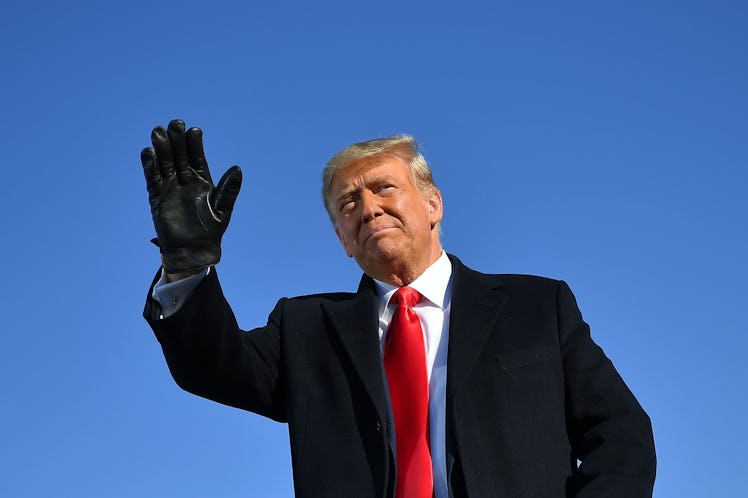
Donald Trump's Term In Office Has A Very Clear End Date
It's been nearly three weeks since the 2020 election was called in favor of President-elect Joe Biden on Nov. 7, and yet, President Donald Trump has refused to deliver a public concession. However, according to the U.S. Constitution, the losing president has no say in who wins American elections — whether he likes it or not. So, exactly when will Donald Trump leave office? Mark your calendars for this very specific date.
The official end of Trump's first term in office is noon on Jan. 20, 2021, which is when President-elect Joe Biden will take the presidential oath of office and replace him in the White House. This date and time are actually written into the 20th Amendment to the U.S. Constitution, which says outright, "The terms of the President and the Vice President shall end at noon on the 20th day of January."
While Trump is apparently reluctant to admit his election loss, the cold fact is that his term has an expiration date. So, despite the Trump administration's barrage of floundering lawsuits and unfounded accusations of widespread election fraud, the only real chance he has at achieving a second term now is in 2024.
In the meantime, the political machinery to transition from a Trump administration to a Biden administration has already begun. On Nov. 23, after a delay of several weeks, General Services Administration (GSA) head Emily Murphy authorized the release of key documentation, funding, and intelligence to the Biden team after continued pressure from Democrats in Congress.
In her letter to Biden authorizing the presidential transition, Murphy said she was not influenced by any party in her decision to delay the process. "I have always strived to do what is right,” she wrote, as reported by The Washington Post. “I was never directly or indirectly pressured by any Executive Branch official — including those who work at the White House or GSA — with regard to the substance or timing of my decision."
Meanwhile, key states like Pennsylvania, Nevada, and Michigan are certifying their election results for Biden, as more and more notable conservative figures are calling on Trump to concede. On Nov. 21, former New Jersey governor and notable Trump ally Chris Christie emphasized in an interview with ABC that, despite claims from the president's legal team, no substantial evidence of election fraud has been presented in court. "This is outrageous conduct by any lawyer," Christie said of Trump's legal team. In a Nov. 20 statement, Rep. Liz Cheney, a Republican from Wyoming, wrote that if the president cannot provide evidence of widespread election fraud, then he needs to "[respect] the sanctity of our electoral process."
As the Dec. 8 deadline for states to certify their election results approaches, the Trump administration's legal options to fight the election results continue to narrow. On Dec. 14, the Electoral College is scheduled to officially cast its votes for president and vice president, officially confirming America's chief leader for the next four years.